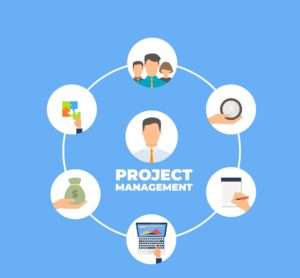
Product management is the heart of any business. It’s like conducting an orchestra, where every note matters. Here, you transform customer needs into products that add value and provide solution to their problems. It’s not just about creating a product, but crafting experiences that people love.
Table of Contents
ToggleIt’s about working with diverse teams, from design to engineering to marketing, and launch to achieve their common goals.
In this article, you’ll learn what is product management and why it is important for business success, key responsibilities of product management, key elements of product management strategy, and product management vs project management.
What is Product Management?
Product management is the process of overseeing the development, marketing, and enhancement of a product or service throughout its lifecycle.
It involves strategic planning, idea generation, market research, product design, development, launch, and ongoing optimization based on customer needs and wants and market trends.
Why Product Management is Important for Business?
Product management strategy refers to the overall plan and approach that a company uses to develop, launch, and manage its products or services effectively in the market. Product managers play a important role in determining what features are most important to customers and the business. They use their strategic thinking skills to prioritize these features, ensuring that the development team works on the most important items first.
Product managers are responsible for the end-to-end product lifecycle, from conceptualization to launch and beyond.
it helps businesses stay competitive and relevant in a constantly evolving market. By understanding customer needs and market trends, product managers can guide the development of products that meet those demands, keeping the company ahead of the curve.
Another importance of product management is effective communication. Product managers work closely with different stakeholders such as engineers, designers, marketers, salespeople, and executives. They act as a central point of contact for these teams, ensuring everyone clearly understands the product vision and objectives.
In essence, Product Management is a journey filled with challenges and rewards, with learning and growth, that’s more important now than ever before.
Core Responsibilities of Product Management
As a product manager, you have one of the most important roles in a company. You are responsible for guiding the success of a product and leading the cross-functional team that develops, launch and continuous improvements through its life cycle.
Here, are the key responsibilities of a product manager typically include:
1. Conduct marketing Research:
Market research is a vital component of product management. You will identify the customers needs, wants and preferences. This involves colleting data and information about competitors offerings and current market trends.
This research helps product manager make informed decisions about product features, pricing, and positioning.
2. Defining Product Vision and Roadmap:
Develop a product vision and strategy that aligns with the company’s overall goals. This means determining what solutions and features will be built based on customers needs, wants and in what order based on the priorities.
This roadmap needs to allign with business goals and be flexible enough to addapt to changes.
3. Collaborating with Cross-functional team:
Product manager collaborate with various company’s departments including sales, marketing, designer, and engineer.
Although, you don’t necessarily need technical background, you need to clearly communicate product prototypes and other requirements and ensure the product meets customer expectations.
4. Analyzing Data and Key Metrics:
PM monitor how customers are using the product and look for ways to optimize the user experience, increasing engagement and drive revenue. Regularly analyzing data enables PM to make data-driven decisions based on facts and figures.
5. Managing the Product Post-Launch:
It is important to keep an eye on how your product performs after it has been launched and to make any necessary adjustments based on feedback and performance metrics. This will help ensure that your product continues to meet the needs and expectations of your customers.
6. Managing the Product Post-Launch:
It is important to monitor the performance of your product after its launch. Gather feedback from customers and analyze performance metrics to make necessary adjustments that will improve the product’s success.
7. Managing Revenue and Pricing:
Product managers are responsible for managing product revenues and pricing. They analyze market demand, competition, and production costs to determine the optimal pricing strategy.
PM also monitor sales performance and make adjustments to pricing and revenue strategies as needed.
8. Balancing Competing Priorities:
There are always more potential features than there are resources to build them. As a result, you need to prioritize based on key factors and make difficult decisions.
9. Continually Optimizing and Improving:
A product manager continually modifies, tests and enhances the product to better align with customers’ needs and business objectives.
Elements of a Product Management Strategy

Product management strategy refers to the overall plan and approach that a company uses to develop, launch, and manage its products or services effectively in the market.
It involves making decisions related to the creation, development, positioning, and life cycle management of products to achieve business goals and satisfy customer needs. As a product manager, developing an effective strategy is key to success.
1. Defining your target customers and their needs: Who will use your product? who is your target audience? How the product solve customers problems? By conducting a thorough research, studying competitors offerings, features and market trends.
By gaining a deep understanding of the market and customers’ requirements, product managers can develop strategies that align with customer expectations.
2. Determine your product vision and roadmap: Where do you want to take your product in the next 6-12 months? Creating a product roadmap that outlines the vision, goals, features, and timeline for product development is essential.
A roadmap helps align stakeholders, prioritize tasks, and communicate the product strategy internally and externally. Keep your roadmap flexible as customer needs change.
3. Selecting features to build: Product managers need to prioritize features based on their value to customers and business goals.
By identifying high-value features that address critical customer needs or have significant revenue potential, they can focus resources effectively.
4. Deciding on a price model: Will you charge high price or low price at introduction stage? Will you charge a one time fee, monthly subscription or something else?
Price based on the value you provide to customers and what competitors are charging. You can always tweak your pricing later based on feedback.
5. Product Positioning and Differentiation: Clearly defining the unique value proposition of the product and positioning it effectively in the market is key to standing out from competitors and attracting target customers.
6.Choose marketing and distribution channels: How will you spread the word about product and get it into customers hands? You can create awareness through social media, email marketing, SEO, and more. Test different channels to find what works for your audience.
7. Lifecycle Management: Managing the product throughout its lifecycle involves monitoring performance, gathering feedback, making updates or enhancements.
Deciding when to retire or replace the product. Product managers need to plan for the long-term success of the product.
8. Cross-functional Collaboration: Product management involves working closely with various teams such as engineering, marketing, sales, and customer support.
Collaboration ensures that all departments are aligned with the product strategy and work together towards a common goal.
9. KPIs and Metrics: Establishing key performance indicators (KPIs) and metrics to measure the success of the product is essential for tracking performance, identifying areas for improvement, and making data-driven decisions.
10. Provide Customer Supports: A good product experience doesn’t end after the purchase. You will inquire customers problems, related to product.
Offer resources to help your customers get the most from your product through documentation, online courses, consultation and timely customer support.
Product Management vs Project Management
Product management and project management are are two distinct roles that often are confused.
These two roles work together in the development and launch of a product. While both roles involve managing resources, timelines, and budgets, they have different focuses and responsibilities.
As a product manager, your goal is to develop and deliver a product that fits the needs of your target customers.
You are responsible for the product vision, roadmap, and key features. You continously research the market and customers to determine how to improve the product. Some of the tasks may include:
- Defining the product strategy and vision.
- Determining the key features and requirements.
- Managing the product roadmap and prioritizing features.
- conducting market research to gain data and information.
- Monitoring key metrics and making data-driven decisions.
- Working with cross functional team like, engineering, designer and market.
- Provide customers support during, or after the sale of a product.
Project managers, on the other hand, are focus on the timely delivery of product and initiates. Their role centers around planning and executing specific projects. often with fixed budget and deadline. Project Manager typically include:
- Create detailed project plans, schedules and budgets.
- Manage risks and help remove roadblocks.
- Oversee the day to day execution of project.
- Track key milestones and deliverable.
- Ensure project are completed on time, within scope and budget.
These roles work side by side, with the product manager focuses on the “what” and “why”, and the project manager concentrated on the “how” and “when”.
Important Skills for Product Manager

You need to have a diverse set of skills to be effective in your role. Here are some of the key skills product managers should develop:
- Communication: Product manager spend a lot of communicating with various team and stakeholders. You need to be able to convey your vision for the product in a clear and compelling engineers, designer, customers.
Strong written and verbal communication skills are essential.
- Strategic Thinking: Product managers must possess an in-depth understanding of the market, competition, and customer needs to make decisions about product direction and features.
Strategic thinking enables them to prioritize features and make data-driven decisions that align with business goals.
- Problem Solving: Problem-solving abilities are also critical in this role. Product managers often face challenges such as resource constraints or changing market dynamics.
Being able to think creatively and find innovative solutions is key to overcoming these obstacles.
- Leadership: Product manager led the team that builds and improves the product. You need to able to motivate and guide cross functional team to achieve a shared vision.
Leadership skills such as influencing, delegating, and managing accountability are important for this role.
- Adaptability to new technologies and a willingness to embrace change are imperative traits for any product manager who wishes to succeed in the industry.
- Technical Knowledge: While you don’t need to be an engineer, product manager should have solid technical understanding to communicate effectively to with development team.
You should understand software design, web technologies, and mobile platforms at a high level.
Conclusion
To wrap up, product management plays a vital role in the success of any organization. It is responsible for driving innovation, understanding customer needs, and delivering value through effective product strategies.
By overseeing the entire lifecycle of a product from conception to launch and beyond, product managers ensure that products meet market demands and remain competitive.
In this article, we have explored what product management entails, its importance in today’s business landscape, key responsibilities and skills required for successful product management. We have also discussed the difference between product management and project management
So whether you’re already in Product Management or considering a career in this field, remember this: Product Management isn’t just a job. It’s a mindset. It’s a skill set. And it’s a journey that can take you places.
Frequently Asked Questions
- What is Product Management?
Product Management is the practice of strategically driving the development, market launch, and continual support and improvement of a company’s products.
- What does a product manager do?
A Product Manager identifies market opportunities, defines the product vision, collaborates with various teams to develop and launch the product, and manages the product post-launch. They use data to make decisions, communicate with stakeholders, and ensure the product delivers value to customers and aligns with the company’s goals.
- What are the 3 major areas of product management?
The three major areas of Product Management are:
Product Strategy: Defining the product vision and roadmap.
Product Development: Overseeing the product’s creation and launch.
Product Marketing: Positioning the product in the market and driving its growth.
- How is Product Management different from Project Management?
While Product Management focuses on the product’s entire lifecycle, Project Management is about executing specific projects within a specified timeframe and budget.
- What skills are required for Product Management?
Key skills include strategic thinking, market research, data analysis, leadership, communication, and a basic understanding of technology.
- Why is Product Management important?
Product Management aligns all aspects of an organization - from development to sales to customer support towards delivering a product that meets market needs and drives business growth.
- What is a Product Strategy?
A Product Strategy outlines the product’s direction and goals. It’s a roadmap that guides the team from product development to market launch and beyond.
- What are the 5 P's of product management?
Perspective: A great Product Manager knows when to focus on the past, present, and future.
Prioritization: They can shift their mental priority list daily, always considering new opportunities.
Persistence: They are persistent in ensuring the team is focused on tasks that generate value for customers.
Presentation: They effectively communicate the product’s vision and strategy to stakeholders.
Passion: They are passionate about their product and continuously strive to improve it1
- How to become product manager?
To become a Product Manager:
Earn a Bachelor’s Degree: Typically in business, technology, or a related field.
Gain Relevant Experience: This could be in roles like marketing, business analysis, or software development.
Learn About Product Management: Through work experience, online courses, or certifications.
Develop Key Skills: Such as leadership, communication, problem-solving, and data analysis.
Network: Connect with other product managers and industry professionals
- what is agile product management?
Agile Product Management is a flexible approach to developing products. Teams work in short cycles called sprints, adapt their plans based on feedback, and make frequent updates to the product. This allows them to respond quickly to changes and continuously improve the product
- Do product managers need technical skills?
Product Managers do benefit from having technical skills, but they don’t need to be experts. Understanding technology helps them work better with engineers and make informed decisions about the product.
- what are key elements of product management strategy?
The key elements of a Product Management Strategy are:
Understanding the Market: Identifying customer needs and market trends.
Defining the Vision: Setting a clear direction for the product.
Building the Roadmap: Outlining the path to achieve the product vision.
Prioritizing Features: Deciding which features to develop based on their value to the customers and the business.
Collaborating with Teams: Working with cross-functional teams to develop and launch the product.
Measuring Success: Using key performance indicators to evaluate the product’s success
- How can I transition into a career in Product Management?
To transition into a career in Product Management you can start by gaining relevant experience through internships or entry-level positions that allow you to work closely with products or services.


